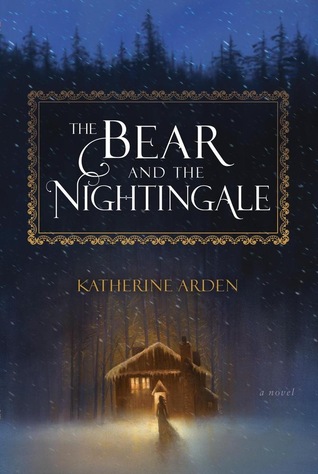When I was a child, I liked reading about Russian fairytales. Some of them were about Ivan (and in Russian fairytales, there was always an Ivan) and his firebird, and how he won over the beautiful princess. Another one was about bringing salt to the tsar. So imagine my surprise and delight when my friend, Parvathi, told me that she was reviewing the book, The Bear and The Nightingale. I knew I had to read it immediately.
Spoilers below. Approach with caution.
In medieval Russia, where a woman either marries or becomes a nun, the Petrovnas live in the middle of the forest, a distance from Moscow. The family gathers round to listen to the nurse to listen to her stories regularly, which are Russian folklore or fairy tales. Vasilisa (Vasya) Petrovna is born as her mother dies, and her grandmother was rumoured to have powers. As she grows up, she sees the magical creatures in the stories her nurse has told, such as the domovoi, a goblin of the household, and a rusalka, a kind of water ghost that lives beneath the lake.
However, her father remarries her stepmother, who is a distant relative of Vasilisa and has the same abilities as her. The stepmother thinks that the creatures she sees are demons as she is Christian, and seeks solace in Konstantin, the priest, who moves to the village. The priest himself sees an evil entity as well, and it guides him to instill fear and loathing in the villagers, who stop giving offerings to the creatures that reside around them. It is up to Vasilisa to save the village before it’s too late.
There was so much to unpack in this story. I enjoyed the folkloric aspects and how the priest instilled hate and fear to jeopardise the safety and well-being of the village, and how Vasya tried her best to stop it by feeding the creatures. The clash of old beliefs and the new kept me riveted to the pages.
More importantly, I enjoyed how Vasya negotiated her role of a woman in society. She refuses to marry and be a nun, which were the only two choices at the time. She is portrayed as strong and independent with her own mind, and does not care about what the villagers think, even though she’s being called a witch for wandering in the woods. Moreover, she’s intelligent and creative, coming up with ways to save the spirits and creatures of Russian folklore when the villagers stop giving them offerings.
Likewise, the antagonists are also compelling, in their own way. Although I did not like how Vasya’s stepmother abused her, I understood her pain, especially when it came from the lack of understanding of her powers. Similarly, Konstantin was also insufferable in converting everyone in the village to Christianity, but it was all too easy to see that this man was also plagued by fear, too.
Most of the elements were tidied up with a neat little bow, and I enjoyed that Vasya was able to have a say in her own destiny, as opposed to marrying death, or the winter king. However, I was dismayed to learn that there would be a sequel as I felt that the author had wrapped up the loose ends as well as she could. I see no reason to continue a story for the sake of milking it for cash, but that is just me.
I’d definitely reocmmend this book to all fairy tale lovers and lovers of all things Russia. Captivating, this book had me glued to it and I don’t want to return it to the library.
